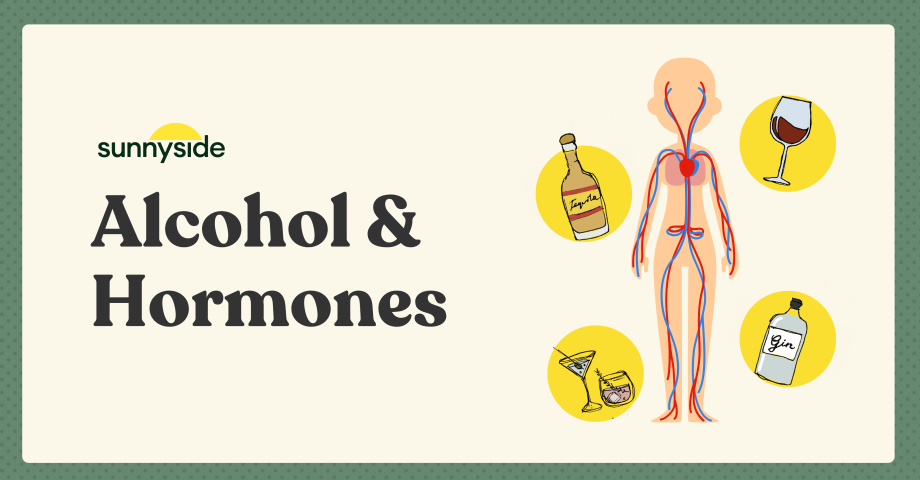Last Updated on May 15, 2023
Hormones help control how your body works, like your metabolism, emotions, mood, sleep, sexual function, and fertility. Any imbalance in the system can bring challenges to mental and physical health, including your ability to manage stress. Drinking alcohol is one way that hormones can become affected. Fortunately, our bodies are extremely resilient and with mindful drinking, your ability to create a balanced hormonal system is strong.
Understanding exactly how alcohol alters your hormones and quality of life will help you gain a better perspective of how it affects you on a day-to-day basis. This can go a long way to help you change your habits by growing your desire to drink mindfully.

6 Ways Alcohol Affects Women’s Hormones
Women are sometimes more affected by alcohol than men. As alcohol influences hormones and women experience greater hormonal changes throughout their life, alcohol can have more of an impact. Here, we’ll outline what’s going on in your body when your hormones are disrupted by alcohol, and what you can do to help.
1) Anxiety and Mood disorders
Taking the time to rest, move your body in fun ways, and enjoy mindful moments daily are key to preventing the daily stressors of life from taking over. Women are naturally more likely to develop stress, depression, and anxiety disorders, making stress-relieving activities all the more necessary. Panic attacks, phobias, generalized anxiety disorder, and even PTSD are almost twice as common in women than in men.
Surprisingly, alcohol can increase the amount of estrogen women produce. However, since there are many other negative hormonal effects of heavy alcohol consumption, it’s not exactly beneficial. More estrogen from alcohol does not guarantee less risk of developing issues. Anxiety, stress, and inflammation have all been shown to increase with drinking.
Mindful habits restore balance
The good news is that stress hormones can find their balance again as soon as you switch to healthier lifestyle habits. With one drink a day or less, the female body can process alcohol without a severe negative impact on hormones. Sleeping well also goes a long way to balance cortisol and even glucose and hunger hormones, helping to control your appetite and avoid weight gain.
2) Menstrual and reproductive cycle
There’s plenty of research showing that alcohol use disrupts hormones responsible for the menstrual cycle. It begins to affect menstruation for girls who drink during puberty and can alter the maturation and function of their ovaries, as it directly affects the growth hormones. Alcohol can cause irregular menstrual cycles, worsen PMS symptoms, and lead to infertility. Even small amounts of alcohol, such as social drinking, can disrupt a normal menstrual cycle.
The association with estrogen is complex, as it can sometimes stimulate or inhibit the hypothalamic-pituitary unit. This unit comprises several organs, such as the hypothalamus, pituitary, gonads, thyroid, and adrenal glands. Alcohol often elevates these hormones and causes an imbalance leading to reproductive and liver issues, along with weight and body fat composition.
However, most of these symptoms are related to heavy drinking and can be avoided with mindful drinking habits. With an overall healthy lifestyle, a balanced menstrual and reproductive cycle is possible.

3) Bone health
The effect of alcohol on bone density seems to change throughout a woman’s life. For example, drinking during puberty disrupts growth hormones and consequently, bone development. It is possible to develop lifelong osteoporosis from heavy drinking at a young age. Bone formation and resorption are heavily tied to the estrogen and androgen systems, where an imbalance leads to bone weakness.
On the other hand, there is some research showing that women who drink moderately have a higher bone mass. This may be because alcohol increases estrogen, which is lacking in adult women, and estrogen is needed for bone growth and turnover. However, this depends on many factors and requires much more research as to safety and methods to achieve a higher bone mass without any of the negative side effects.
4) Breast cancer
The link between alcohol and breast cancer has long been established. Alcohol raises endogenous hormones (like estrogen and testosterone), which affects the growth of breast tissues and increases breast cancer risk. Insulin-like growth factor (IGF)-1 also increases with alcohol use and causes both breast tissue and breast cancer cells to grow. The more dense breasts become, the higher the chance of developing breast cancer. High estrogen levels can also damage DNA and transform healthy cells into cancerous ones.
Drinking heavily (three or more drinks per day) puts the risk at 40-50%, while one drink per day decreases that risk to 4. Of course, these numbers are also affected by other factors, like nutrition (especially folate deficiency), lifestyle habits, or hormone replacement therapy. Moving towards a healthy lifestyle with nutrition, exercise, sleep, and mindful drinking can largely reduce the risk of developing breast (and other) cancers.
5) Loss of female characteristics
While not well known, alcohol is also associated with a loss in female characteristics. It causes an increase in testosterone levels in premenopausal women and a decrease in androstenedione. This combination means androgen levels are imbalanced and sexual female characteristics decline. It’s mostly been shown to occur in heavy drinkers, which is why mindful drinking can help you avoid this effect.
6) Brain function and neural disorders
Cognitive issues are higher and more severe in women, partially due to the loss of estrogen women experience as they age. Up to 50% of women 85 and older develop some form of dementia. Estrogens affect neurotrophins, which are necessary proteins for new nerve cell growth and neural maintenance.
Like with the endocrine system, alcohol disrupts the brain’s communication pathways. Heavy drinking has been shown to increase the risk of dementia, brain damage, and mental health issues. Fortunately, mindful drinking decreases these risks and helps the body to better maintain its estrogen balance.

Healthy habits to decrease hormonal imbalances
Making the effort to prioritize sleep, nutrition, and exercise can decrease the effects of alcohol and improve your overall mood and health. An overall balanced lifestyle also balances hormones and helps you manage stress better. Amazingly, just taking the time to be more mindful in general naturally reduces alcohol consumption.
With mindful drinking, your body will have the opportunity to rebalance and function at its best, which includes eating and sleeping better (and we all know how easy it is to feel cranky and low with just one night’s bad sleep).
Try Sunnyside for support
We know it’s not easy to change old habits and it might seem overwhelming, but living a more mindful and healthy lifestyle is possible with time and most importantly, with support. That’s why Sunnyside promotes mindful drinking, to encourage a healthier lifestyle without the stress or pressure to quit entirely. Instead, you get encouragement to develop healthy habits that make you feel your best, like participating in alcohol reset challenges, resources to help you get more educated about the impact of alcohol, and support from our dedicated team of coaches. Take the 3-minute quiz to get started and build your personalized drinking plan.



